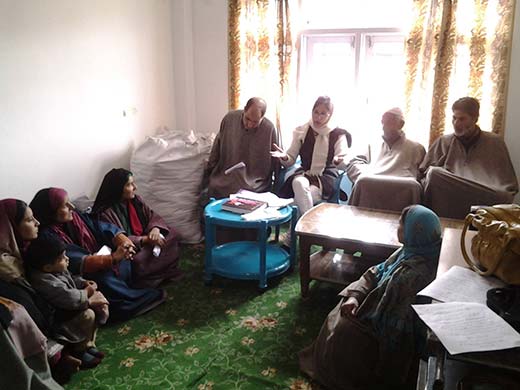Next time you find a lady on your doorstep selling tea and other items, don’t fret. A law post graduate from US is helping women in South Kashmir add to their family’s income. Suhail A Shah reports

The small room at the first floor of this under construction building, in Dialgam village of south Kashmir’s Islamabad district, has a steady trickle of women visitors throughout the day. The women come to pick packets of tea leaves.
The packets are not any kind of relief, however. The women sell these tea leave bags door to door and/or at their shops throughout Dialgam and some adjoining villages.
Thirty-two-year old Raheela Saleem Narchoor, a post graduate in law from the United States (US), gleefully greets the visitors and asks her helper to make a note of transactions.
This all women trade centre is part of the Centre for Human Development (CHD) set up by Raheela after completing her Ford International fellowship in gender studies law at the Indiana University in the US.
First of its kind in South Kashmir, the CHD has been set up with the aim of creating economic opportunities for rural women and impart prerequisites of handling trade to them.
“The CHD is primarily aimed at visibility of women in a non-conventional way in our traditional society. I am trying to achieve the goal by providing business opportunities to the women,” says Raheela, a resident of main Islamabad town.
She, before setting up the centre, has worked for International Humanitarian Organization Amnesty International (AI).
However, “moved by the grim education scenario and plight of women in Kashmir” Raheela, finally opted to stay back in Kashmir and work here.
For now the CHD is buying products directly from the suppliers from parts of India and distributing it among the women in these villages, willing to earn a livelihood on their own and/or support their families.
The idea, Raheela says, is to cut down the margins of distributors and small time dealers which add up to the market cost of various day-to-day products.
“We have shortened the chain. We get the products for these women to sell and they keep the profits,” says Raheela.
CHD however is adding on to the products to be sold and after tea they have managed to acquire soap bars and detergent for these women to sell.
So far, after campaigning in many villages including Dehruna, Shreczan, Dialgam and Pethbugh; the CHD has managed to get a decent response with 12 women already selling the products.
While some of the women got engaged with sale of these products door to door in their vicinity, others have preferred to stock products at shops belonging to their families.
“They are doing good and every one of them have managed to add up a certain amount of profit, which will be transferred to their bank accounts at the month end,” Raheela said.
The word of mouth publicity is helping the Centre as more women, some out of curiosity and some with genuine wish to earn money, visit Raheela every day.
CHD targets grooming and training a substantial number of women and, “the next step will be to set up small manufacturing units in these villages to begin with.”
Asked if she was trying to create labourers, Raheela says she wants to create independent working women.
The profits from manufacturing, like from selling products, will entirely go to the women working at these units, she assures.
Furthermore, “We will be glad to assist any woman who will want to set up a manufacturing unit of her own.”
Besides, the women will have a monopoly over the products they manufacture and anybody who wants to sell these products will have to acquire them through these women.
However, all is not hunky dory for the CHD. Like all new ideas it will have to cope up with certain socio-cultural as well as economic hurdles before it blooms into a sustainable source of income for these women.
Raheela acknowledges the fact that women selling goods door-to-door in rural Kashmir are looked ‘down upon’.
“We will have to change the mind set for that and that is exactly what I am out here to do,” she says, quoting the example of one of her clients whose husband initially opposed the idea of his wife setting up a shop.
“We made her sell products in her locality and after seeing the profits involved her husband had to give in,” Raheela explains.
This, however, might not be a singled out instance and it still remains to be seen how fast and how effectively the CHD will manage to change the ‘mind set’.
Then there are security related issues the women supposed to be selling door-to-door will have to face, for there is an overwhelming presence of troopers in rural areas of South Kashmir.
And even if things go according to plan, Raheela and her CHD will have to device ways to retain product monopoly for their clients given the fact that too many sellers might leave a handful of buyers.
Raheela, however, sounds positive and hopes she will bring about a change.
She also intends to establish an educational institute in the area.















